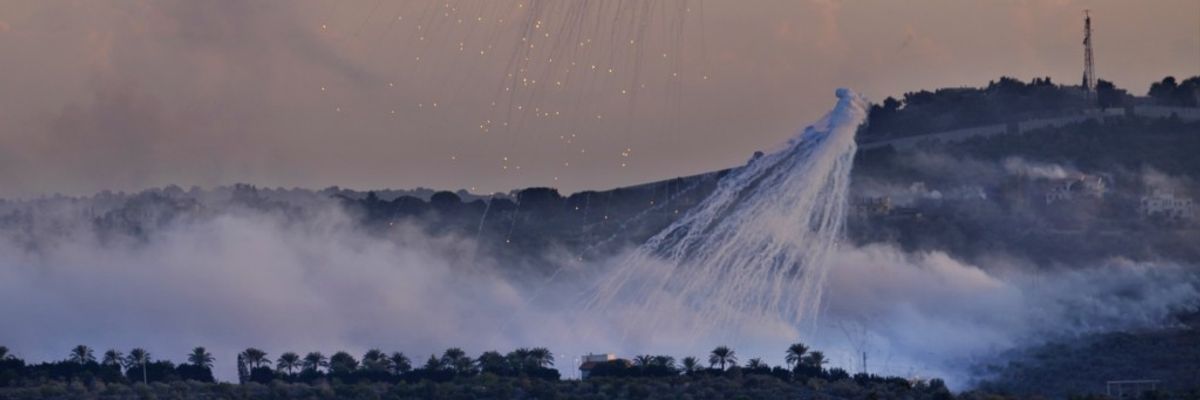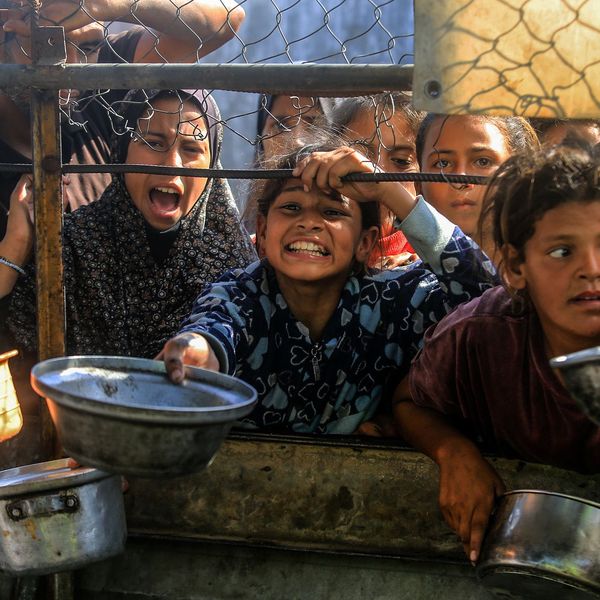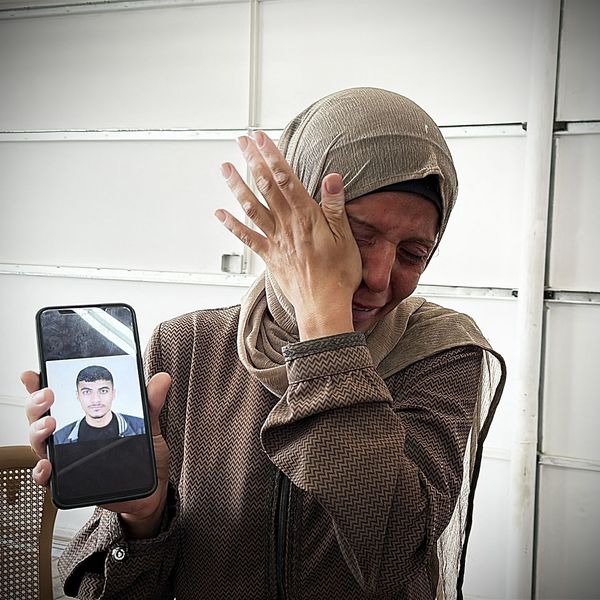
A shell from Israeli artillery explodes over a Lebanese border village on October 16, 2023.
Amnesty: Israel's Illegal Use of White Phosphorus in Lebanon a Possible 'War Crime'
"This should be front-page news in mainstream media," said one observer. "But it probably won't even warrant mention in this climate. Crazy."
Amnesty International on Tuesday shared evidence that Israel has unlawfully used artillery shells containing white phosphorus in southern Lebanon amid intensified fighting with the militant group Hezbollah as Israeli forces wage war on the Gaza Strip.
"White phosphorus is an incendiary substance mostly used to create a dense smoke screen or mark targets," the human rights group explained earlier this month. "It burns at extremely high temperatures when exposed to air, and can continue to burn inside flesh. It causes horrific pain and life-changing injuries, and cannot be put out with water."
Amnesty revealed that its researchers "gathered compelling evidence," including photographs and videos, indicating four recent uses of the substance in Lebanon. For one case, the group's Crisis Evidence Lab "verified a video showing artillery-dispersed smoke plumes, consistent with white phosphorus munitions," on the town of Dhayra.
"Launching an indiscriminate attack resulting in loss of life or injuries to civilians or damage to civilian objects is a war crime."
Dhayra Mayor Abdullah al-Ghrayyeb told Amnesty that shelling of the populated civilian area started in the afternoon on October 16 and continued into the night.
"A very bad odor and massive cloud covered the town so that we were not able to see beyond five or six meters in front of us," he said. "This caused people to frantically flee their homes. And when some returned two days later, their houses were still burning. Cars caught fire. Land areas were also burnt down. Until today, you find remnants—the size of a fist—that reignite when exposed to air."
Ali Safieddine, regional director of the Lebanese Civil Defense, facilitated the transfer of civilians to the hospital and the evacuation of Dhayra. He said residents called reporting "bombs that are producing extremely bad odor and causing suffocation once inhaled."
"Four members of our staff as well as a number of people living in Dhayra were admitted to a hospital for suffocation in the past few days," Safieddine told Amnesty on October 17. "We were not able to see even our own hands due to the heavy white smoke that covered the town all night long and lasted till this morning."
Dr. Haitham Nisr confirmed that medical teams treated at least nine patients from the Dhayra, Yarine, and Marwahin who were suffering from shortness of breath and coughing on October 16-17.
"Launching an indiscriminate attack resulting in loss of life or injuries to civilians or damage to civilian objects is a war crime," Amnesty stressed. "This attack on Dhayra, which injured civilians and damaged civilian objects, was indiscriminate and therefore unlawful. It must be investigated as a war crime."
Aya Majzoub, Amnesty's deputy regional director for the Middle East and North Africa, declared Tuesday that "it is beyond horrific that the Israeli army has indiscriminately used white phosphorous in violation of international humanitarian law."
"With concern growing about an intensification of the hostilities in southern Lebanon, the Israeli army must immediately halt the use of white phosphorus, especially in populated areas, in line with its forgotten 2013 pledge to stop using these weapons," she argued. "It must abide by its commitment and stop further endangering the lives of civilians in Lebanon."
Al Jazeera reported Monday that "there is growing fear in Lebanon that fighting between the armed group Hezbollah and Israel could spiral out of control, even as many residents sympathize with the Palestinians under bombardment in Gaza."
After a Hamas-led surprise attack that killed as many as 1,400 Israelis, Israel responded with what's being called a "genocidal" assault of Gaza, killing more than 8,500 Palestinians—including over 3,500 children—and devastating civilian infrastructure. Israeli forces have also been accused of illegally using white phosphorus in the besieged strip.
Human Rights Watch said earlier this month that it "verified videos taken in Lebanon and Gaza on October 10 and 11, 2023, respectively, showing multiple airbursts of artillery-fired white phosphorus over the Gaza City port and two rural locations along the Israel-Lebanon border, and interviewed two people who described an attack in Gaza."
While Israel Defense Forces spokesperson Lt. Col. Peter Lerner denied Israeli use of white phosphorus in Gaza or Lebanon, Amnesty also said in mid-October that it had "gathered compelling evidence documenting the use of white phosphorus artillery shells by the Israeli army in densely populated civilian areas in Gaza, many of which may be considered unlawful indiscriminate attacks."
An Urgent Message From Our Co-Founder
Dear Common Dreams reader, The U.S. is on a fast track to authoritarianism like nothing I've ever seen. Meanwhile, corporate news outlets are utterly capitulating to Trump, twisting their coverage to avoid drawing his ire while lining up to stuff cash in his pockets. That's why I believe that Common Dreams is doing the best and most consequential reporting that we've ever done. Our small but mighty team is a progressive reporting powerhouse, covering the news every day that the corporate media never will. Our mission has always been simple: To inform. To inspire. And to ignite change for the common good. Now here's the key piece that I want all our readers to understand: None of this would be possible without your financial support. That's not just some fundraising cliche. It's the absolute and literal truth. We don't accept corporate advertising and never will. We don't have a paywall because we don't think people should be blocked from critical news based on their ability to pay. Everything we do is funded by the donations of readers like you. Will you donate now to help power the nonprofit, independent reporting of Common Dreams? Thank you for being a vital member of our community. Together, we can keep independent journalism alive when it’s needed most. - Craig Brown, Co-founder |
Amnesty International on Tuesday shared evidence that Israel has unlawfully used artillery shells containing white phosphorus in southern Lebanon amid intensified fighting with the militant group Hezbollah as Israeli forces wage war on the Gaza Strip.
"White phosphorus is an incendiary substance mostly used to create a dense smoke screen or mark targets," the human rights group explained earlier this month. "It burns at extremely high temperatures when exposed to air, and can continue to burn inside flesh. It causes horrific pain and life-changing injuries, and cannot be put out with water."
Amnesty revealed that its researchers "gathered compelling evidence," including photographs and videos, indicating four recent uses of the substance in Lebanon. For one case, the group's Crisis Evidence Lab "verified a video showing artillery-dispersed smoke plumes, consistent with white phosphorus munitions," on the town of Dhayra.
"Launching an indiscriminate attack resulting in loss of life or injuries to civilians or damage to civilian objects is a war crime."
Dhayra Mayor Abdullah al-Ghrayyeb told Amnesty that shelling of the populated civilian area started in the afternoon on October 16 and continued into the night.
"A very bad odor and massive cloud covered the town so that we were not able to see beyond five or six meters in front of us," he said. "This caused people to frantically flee their homes. And when some returned two days later, their houses were still burning. Cars caught fire. Land areas were also burnt down. Until today, you find remnants—the size of a fist—that reignite when exposed to air."
Ali Safieddine, regional director of the Lebanese Civil Defense, facilitated the transfer of civilians to the hospital and the evacuation of Dhayra. He said residents called reporting "bombs that are producing extremely bad odor and causing suffocation once inhaled."
"Four members of our staff as well as a number of people living in Dhayra were admitted to a hospital for suffocation in the past few days," Safieddine told Amnesty on October 17. "We were not able to see even our own hands due to the heavy white smoke that covered the town all night long and lasted till this morning."
Dr. Haitham Nisr confirmed that medical teams treated at least nine patients from the Dhayra, Yarine, and Marwahin who were suffering from shortness of breath and coughing on October 16-17.
"Launching an indiscriminate attack resulting in loss of life or injuries to civilians or damage to civilian objects is a war crime," Amnesty stressed. "This attack on Dhayra, which injured civilians and damaged civilian objects, was indiscriminate and therefore unlawful. It must be investigated as a war crime."
Aya Majzoub, Amnesty's deputy regional director for the Middle East and North Africa, declared Tuesday that "it is beyond horrific that the Israeli army has indiscriminately used white phosphorous in violation of international humanitarian law."
"With concern growing about an intensification of the hostilities in southern Lebanon, the Israeli army must immediately halt the use of white phosphorus, especially in populated areas, in line with its forgotten 2013 pledge to stop using these weapons," she argued. "It must abide by its commitment and stop further endangering the lives of civilians in Lebanon."
Al Jazeera reported Monday that "there is growing fear in Lebanon that fighting between the armed group Hezbollah and Israel could spiral out of control, even as many residents sympathize with the Palestinians under bombardment in Gaza."
After a Hamas-led surprise attack that killed as many as 1,400 Israelis, Israel responded with what's being called a "genocidal" assault of Gaza, killing more than 8,500 Palestinians—including over 3,500 children—and devastating civilian infrastructure. Israeli forces have also been accused of illegally using white phosphorus in the besieged strip.
Human Rights Watch said earlier this month that it "verified videos taken in Lebanon and Gaza on October 10 and 11, 2023, respectively, showing multiple airbursts of artillery-fired white phosphorus over the Gaza City port and two rural locations along the Israel-Lebanon border, and interviewed two people who described an attack in Gaza."
While Israel Defense Forces spokesperson Lt. Col. Peter Lerner denied Israeli use of white phosphorus in Gaza or Lebanon, Amnesty also said in mid-October that it had "gathered compelling evidence documenting the use of white phosphorus artillery shells by the Israeli army in densely populated civilian areas in Gaza, many of which may be considered unlawful indiscriminate attacks."
- 'A Massive War Crime': Israel Announces Total Blockade of Gaza Strip ›
- Amnesty Probe Finds 'Damning Evidence of War Crimes' by Israel in Gaza ›
- Israel Accused of 'Blatant War Crime' as HRW Confirms White Phosphorus Used in Gaza ›
- Amnesty Urges War Crimes Probe of 'Indiscriminate' Israeli Attacks on Gaza Camps | Common Dreams ›
- 25% of Gazans Wounded in Israeli Assault 'Have Life-Changing Injuries': WHO | Common Dreams ›
- Israel Again Accused of Illegally Using White Phosphorus in Lebanon | Common Dreams ›
- Israeli Use of White Phosphorus in Lebanon Injured UN Peacekeepers: Report | Common Dreams ›
- Amnesty Urges War Crimes Probe of 'Indiscriminate' Israeli Attacks on Lebanon | Common Dreams ›
Amnesty International on Tuesday shared evidence that Israel has unlawfully used artillery shells containing white phosphorus in southern Lebanon amid intensified fighting with the militant group Hezbollah as Israeli forces wage war on the Gaza Strip.
"White phosphorus is an incendiary substance mostly used to create a dense smoke screen or mark targets," the human rights group explained earlier this month. "It burns at extremely high temperatures when exposed to air, and can continue to burn inside flesh. It causes horrific pain and life-changing injuries, and cannot be put out with water."
Amnesty revealed that its researchers "gathered compelling evidence," including photographs and videos, indicating four recent uses of the substance in Lebanon. For one case, the group's Crisis Evidence Lab "verified a video showing artillery-dispersed smoke plumes, consistent with white phosphorus munitions," on the town of Dhayra.
"Launching an indiscriminate attack resulting in loss of life or injuries to civilians or damage to civilian objects is a war crime."
Dhayra Mayor Abdullah al-Ghrayyeb told Amnesty that shelling of the populated civilian area started in the afternoon on October 16 and continued into the night.
"A very bad odor and massive cloud covered the town so that we were not able to see beyond five or six meters in front of us," he said. "This caused people to frantically flee their homes. And when some returned two days later, their houses were still burning. Cars caught fire. Land areas were also burnt down. Until today, you find remnants—the size of a fist—that reignite when exposed to air."
Ali Safieddine, regional director of the Lebanese Civil Defense, facilitated the transfer of civilians to the hospital and the evacuation of Dhayra. He said residents called reporting "bombs that are producing extremely bad odor and causing suffocation once inhaled."
"Four members of our staff as well as a number of people living in Dhayra were admitted to a hospital for suffocation in the past few days," Safieddine told Amnesty on October 17. "We were not able to see even our own hands due to the heavy white smoke that covered the town all night long and lasted till this morning."
Dr. Haitham Nisr confirmed that medical teams treated at least nine patients from the Dhayra, Yarine, and Marwahin who were suffering from shortness of breath and coughing on October 16-17.
"Launching an indiscriminate attack resulting in loss of life or injuries to civilians or damage to civilian objects is a war crime," Amnesty stressed. "This attack on Dhayra, which injured civilians and damaged civilian objects, was indiscriminate and therefore unlawful. It must be investigated as a war crime."
Aya Majzoub, Amnesty's deputy regional director for the Middle East and North Africa, declared Tuesday that "it is beyond horrific that the Israeli army has indiscriminately used white phosphorous in violation of international humanitarian law."
"With concern growing about an intensification of the hostilities in southern Lebanon, the Israeli army must immediately halt the use of white phosphorus, especially in populated areas, in line with its forgotten 2013 pledge to stop using these weapons," she argued. "It must abide by its commitment and stop further endangering the lives of civilians in Lebanon."
Al Jazeera reported Monday that "there is growing fear in Lebanon that fighting between the armed group Hezbollah and Israel could spiral out of control, even as many residents sympathize with the Palestinians under bombardment in Gaza."
After a Hamas-led surprise attack that killed as many as 1,400 Israelis, Israel responded with what's being called a "genocidal" assault of Gaza, killing more than 8,500 Palestinians—including over 3,500 children—and devastating civilian infrastructure. Israeli forces have also been accused of illegally using white phosphorus in the besieged strip.
Human Rights Watch said earlier this month that it "verified videos taken in Lebanon and Gaza on October 10 and 11, 2023, respectively, showing multiple airbursts of artillery-fired white phosphorus over the Gaza City port and two rural locations along the Israel-Lebanon border, and interviewed two people who described an attack in Gaza."
While Israel Defense Forces spokesperson Lt. Col. Peter Lerner denied Israeli use of white phosphorus in Gaza or Lebanon, Amnesty also said in mid-October that it had "gathered compelling evidence documenting the use of white phosphorus artillery shells by the Israeli army in densely populated civilian areas in Gaza, many of which may be considered unlawful indiscriminate attacks."
- 'A Massive War Crime': Israel Announces Total Blockade of Gaza Strip ›
- Amnesty Probe Finds 'Damning Evidence of War Crimes' by Israel in Gaza ›
- Israel Accused of 'Blatant War Crime' as HRW Confirms White Phosphorus Used in Gaza ›
- Amnesty Urges War Crimes Probe of 'Indiscriminate' Israeli Attacks on Gaza Camps | Common Dreams ›
- 25% of Gazans Wounded in Israeli Assault 'Have Life-Changing Injuries': WHO | Common Dreams ›
- Israel Again Accused of Illegally Using White Phosphorus in Lebanon | Common Dreams ›
- Israeli Use of White Phosphorus in Lebanon Injured UN Peacekeepers: Report | Common Dreams ›
- Amnesty Urges War Crimes Probe of 'Indiscriminate' Israeli Attacks on Lebanon | Common Dreams ›

